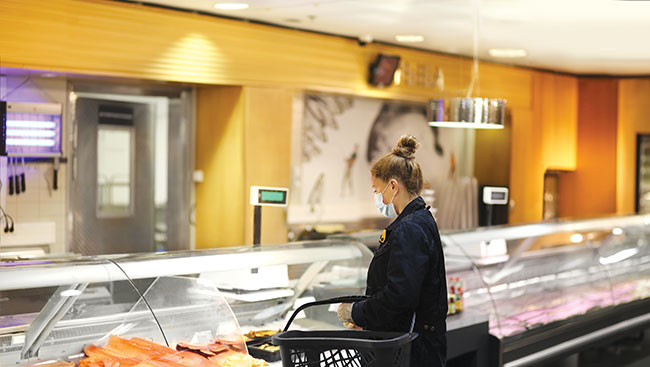
Beyond resilience
July 7, 2021
By Arsenia King
How the seafood industry can transform and effect change in post-pandemic world
 The current crisis can open up opportunities for change not just in rules and practices but also in values, suggests a panelist Photo: © lado2016 / Adobe Stock
The current crisis can open up opportunities for change not just in rules and practices but also in values, suggests a panelist Photo: © lado2016 / Adobe Stock The current pandemic presents the seafood industry with opportunities to shift mindset and effect change that will have broader, deeper, and more inclusive global impact as it prepares for similar turmoil in the future.
At the Seafood Expo North America Reconnect virtual conference early this year, a panel of experts in resiliency and transformation research shared insights on how the seafood industry and its partners can address issues that negatively impact the sector, including COVID-19, supply chain disruptions, climate change and systemic inequity perpetuated by global supply chains.
The panel, which included Eduard Müller, president of the University for International Cooperation in Costa Rica; Peter Olson, researcher from the Stockholm Resilience Centre; and Steve Waddell, co-lead of The Bounce Beyond, said tackling these issues requires understanding how change happens and designing appropriate response to them.
The panel kicked off with sharing of results from the Global Seafood Market Strategy Evaluation jointly undertaken by grant-making organizations The David and Lucile Packard Foundation and the Walton Family Foundation which sought to understand the progress the global sustainable seafood movement has made over the past two decades.
The report suggested that progress by the movement has been instrumental in helping the seafood industry weather the headwinds caused by the COVID-19 pandemic.
However, the report also noted that industry intervention on things like buyer commitments, pre-competitive collaborations, certifications and ratings, and social responsibility are “not enough.”
“We saw that our impact is really too small to match the global scale of the challenges. We had to question whether we are achieving what we needed to achieve if we were to serve as resource for our businesses, our planet, and the people who depend on seafood for their livelihood,” said Teresa Ish, senior program officer, Environmental Program, Walton Family Foundation.
Affirming that individual companies and nations alone cannot address these challenges, Steve Waddell, who is involved in Global Sustainable Seafood Transformations Working Group, emphasized the importance of transformation, which he said requires a shift in thinking about seafood as a “discrete activity” to understand the broader concern for the industry’s social and environmental impact.
“When we talk about the seafood industry and system, there was a recognition that its success is dependent upon a complexity of environmental social and market factor,” Waddell said.
Waddell maintained that transformation requires broader involvement of communities, regulators, and interest groups. He also emphasized the importance of collecting data to guide the industry in its desired environmental and social outcomes as well as applying “systems thinking” to better understand the connections between individual actions and diverse relationships.
Peter Olsson agreed with Waddell’s suggestion on the need to ensure a voice and representation of small-scale stakeholders and marginalized groups if the seafood sector were to take on transformation issues and aspire to be a true sustainability forerunner.
Olsson said a lot of the transformation initiatives nowadays are more about changing rules and practices than changing deeper values, but the current crisis can open up opportunities for change. “We need specific capacities to seize those opportunities. The pandemic has shown the importance of understanding the role of crisis in societal change. Crisis can trigger the mobilization of networks of people who want to develop alternatives that will have an impact at scale,” Olsson said.
Eduard Müller expressed the need for immediate action. “The big question is: Will we be able to act on time? What will we tell our kids?
“Our problem is our structure and science are reductionist. We cannot solve complex problems unless we adopt a holistic way of thinking. Many people do not really realize that biodiversity loss, which includes marine biodiversity, is probably going to be the biggest issue that gets us out of our safe operating space. Agriculture is responsible for 80 percent of global changes,” said Müller.
Müller said lack knowledge is not the issue. “Every year we produce more knowledge, more data than previous history. We have just forgotten to turn it into wisdom, think what this knowledge can provide us and how to bring it into decision making.
Müller left the audience with a challenge: “So the question is: Are we going to just watch and see how this new normal goes, or are we going to act?”
Advertisement
- Nova Scotia farmers celebrate renewed partnership with Canadian government
- Texas oyster farming permits stuck in regulation mire





